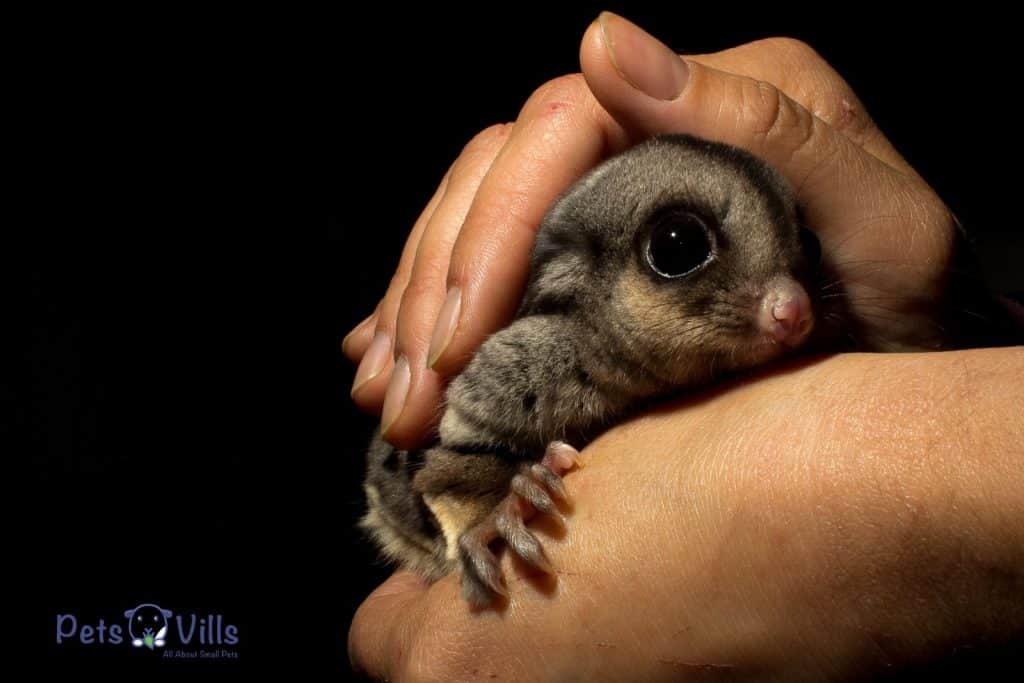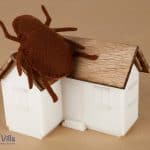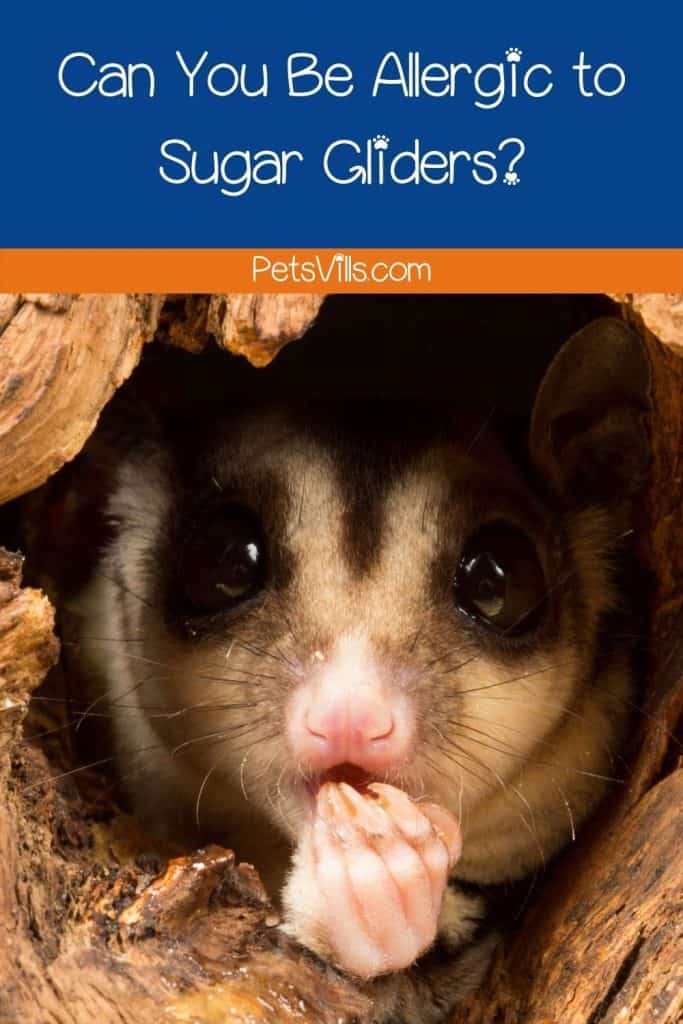Are sugar gliders hypoallergenic?
This is something we had to find out when my daughter, who is allergic to so many things, decided she wanted to become the proud pet owner of one of these exotic animals.
Or rather two of them, since they are social animals that need to live in pairs or small groups.
Turns out the simple truth is some people say they are, and others say they are not, making those with an allergy issue carefully consider becoming glider owners.
Table of Contents
Why You Can Develop an Allergy to a Pet?
Are sugar gliders hypoallergenic, and does it matter if you are not prone to allergy attacks? Yes, it does matter.

Though gliders are amazing creatures, they are also known by some to trigger allergy symptoms such as a runny nose, watery eyes, or itchy skin.
Sometimes bad allergies can even develop in those who have never had a pet allergy in their entire lives.
The main reasons pet allergies develop are:
- pet dander (animal dander is simply the shedding of dead skin cells)
- furry animals (animal hair can cause people to develop pet allergies)
- allergy in connection with pet care items (such as pine dust, scented items, food pellets, etc.)
- The Mayo Clinic advises against coming into contact with both pet saliva and pet urine to avoid health issues like allergies (1)
- Allergies occur when your immune system reacts to a foreign substance (which could include your pet glider or items associated with it)
- With the sugar glider specifically, bacteria under their nails can cause those with sensitive skin to break out in a rash, a symptom common to developing or having an allergy.
Are Sugar Gliders Hypoallergenic?

Everything you need to know about sugar gliders can be fairly easy to determine via a little research. The one area that remains controversial, however, is whether or not they are hypoallergenic.
One source says the sugar glider is a great pet to own because they only need yearly veterinarian care:
“A sugar glider does not need vaccinations.” “Sugar gliders should, at minimum, have a yearly wellness exam and fecal floatation to test for intestinal parasites.” (2)
Other sites will tell you they are more difficult pets to own. They require specialized care, especially in terms of a proper diet, and unique veterinary care (not every DMV can work with them).
The latter will also tell you the glider is not hypoallergenic. Even though they have a low amount of dander, which is good for people with allergies, they do have fur.
Thus, the hair of a glider may be an allergy trigger. So therefore the answer to Is it possible to be allergic to sugar gliders is yes, but the probability of it is not as high as it may be with other pets.
Does this mean you should not own pet gliders if you commonly have to deal with allergies? Not at all! My daughter has bad allergies to typical house pets such as cats and dogs. She was 100% fine with the sugar gliders.
Of course, every person is different and will have to judge their allergy tolerance on their own. Chances are good though, that this is the right pet to own for allergy sufferers.
What To Do If You Are Allergic To Sugar Gliders
You want to know how to take care of a sugar glider, for sure, but you also want to learn how to take care of yourself if you develop an adverse reaction to your new pet.
If you find yourself with sugar glider allergies after you have delved into glider ownership, there are some things you can do to mitigate agitation:
- Invest in a good AC filter (a high-quality air filter can help trap fur and other pollutants that might trigger your allergies)
- Use gloves to handle your pet (make sure to take care to be extra gentle with your glider while you have your hands in the gloves).
- Be sure to keep these exotic pets in colonies of 2 or more for the entire life span. They are sociable creatures who will self-mutilate if they live alone, causing bacteria under their nails to surface and spread.
Learn more about why gliders need to live in pairs or more in this video.
Do Sugar Gliders Carry Diseases?
Doctor of Veterinary Medicine, Laurie Hess, says:

“Sugar gliders are susceptible to infection with common bacteria, including Pasteurella multocida (commonly contracted from pet rabbits), staphylococci, streptococci, Mycobacterium sp (especially in skin), Klebsiella sp, and Clostridium,” (3).
According to the Merck Veterinary Manual, gliders can carry salmonellosis (4). This bacteria can be found on their skin and in their feces and it can be transmitted to their owners (3).
They can also carry Giardiasis. This is an intestinal infection brought about by the bacteria Giardia. It can be transmitted to humans and leave them with diarrhea and stomach cramps (5).
Close to 15% of all gliders carry Giardiasis. It is passed through feces so simply wearing gloves can be an effective deterrent (6).
Protozoal Disease is also common with gliders and may affect the neurological functions of your pet. It is primarily contacted via cat feces, so it is best to keep your glider separate from the cat litter box (and the cat!) (3).
While some of their diseases may be a bother to humans, others such as glider obesity, which may occur if they are fed their favorite sugary foods too often, remain with them alone (7).
It is best to avoid too much sugar glider fat for your pet’s health
The best way to ensure you and your glider is protected from disease is to have proper veterinary care, both for proactive measures and treatment (if needed).
Keeping your glider healthy is one way to reduce the risk of disease. The vet in this video talks about one important part of your pet’s health – diet
FAQ
Can sugar gliders be potty trained?
The short answer is no, though some people mistake them for being creatures of habit, for being potty trained.
It is also worth knowing that gliders will mark their territory with urine.
Is it illegal to own a sugar glider?

It is legal in many states, while in others it is illegal. Be sure to check your city and state regulations prior to making a purchase, or accepting a sugar glider as a pet.
Are sugar gliders hypoallergenic?
Because of their low skin dander, they tend to lean towards being hypoallergenic. They do, however, have pet fur, so the risk of allergies is present, though low, which makes the answer to this question yes…and no.
Do sugar gliders live a long time?
Pet gliders can live to be 15 years old!
Do sugar gliders stink?
Sugar glider smell can come from their naturally musky odorous bodies, improper diet, gland secretion, urine, and feces in their cage.
There are ways to help reduce the smells associated with this pet, but chances are high they will not be odorless.
Can you get sick from sugar gliders?
Yes, gliders can transmit diseases to humans that can make them sick.
Take precautions when handling your glider, or when cleaning their living spaces to ensure both you and your pet stay as healthy as possible.
Do gliders get mites?

Gliders that live in the wild commonly do have fleas and mites. Those who are born and raised in captivity, not so much.
Be sure to check regularly for infestations or visitors from these nasty little buggers, and treat accordingly.
Conclusion
Are sugar gliders hypoallergenic and do they make good pets for people with allergies?
Gliders are amazing pets for those who wish to take the time to learn how to properly care for, feed, and clean them and their immediate areas.
As with any pet, precautions should be taken to lessen the risks associated with animal care, including those associated with potential allergies.
While most people will find their glider to be hypoallergenic in their particular situations, there are a small number of people who will find themselves sensitive to pet fur, or scents associated with pet care products.
For those small number of glider owners, these pets are not hypoallergenic, however, with careful research and consideration, even people who have allergic reactions to these cute little pocket pets can find a way to successfully own them.
We were fortunate in that my daughter, who is allergic to even the word ‘pets’, had no trouble at all with her little marsupial friends.
In fact, when she graduated college and set out for life on her own, she opted to take her beloved friends with her.
For a child who could not even breathe right with a dog or cat in the house, it was a pet/human match made in heaven.

Have you experienced allergy symptoms whenever you were around your sugar glider? If so, please share with us how you dealt with it down below!
Resources
- (1) “Pet Allergy – Symptoms and Causes.” Mayo Clinic, 2019, www.mayoclinic.org/diseases-conditions/pet-allergy/symptoms-causes/syc-20352192.
- (2) “Everything You Need to Know about Sugar Gliders.” TexVetPets, 2016, www.texvetpets.org/article/sugar-gliders/.
- (3) President, S. G. A., and Founder. “Diseases and Syndromes of Sugar Gliders.” Sugar Glider Association of Phoenix Arizona, 27 July 2020, sugargliderassociationaz.wordpress.com/2020/07/27/diseases-and-syndromes-of-sugar-gliders/. Accessed 7 May 2022.
- (4) “Diseases and Syndromes of Sugar Gliders – Exotic and Laboratory Animals.” Merck Veterinary Manual, www.merckvetmanual.com/exotic-and-laboratory-animals/sugar-gliders/diseases-and-syndromes-of-sugar-gliders.
- (5) “Giardiasis in Animals – Digestive System.” Merck Veterinary Manual, www.merckvetmanual.com/veterinary/digestive-system/giardiasis-giardia/giardiasis-in-animals. Accessed 7 May 2022.
- (6) “Giardiasis in Animals – Digestive System.” Merck Veterinary Manual, www.merckvetmanual.com/veterinary/digestive-system/giardiasis-giardia/giardiasis-in-animals.
- (7) “Disorders and Diseases of Sugar Gliders – All Other Pets.” Veterinary Manual, www.msdvetmanual.com/all-other-pets/sugar-gliders/disorders-and-diseases-of-sugar-gliders.
Alina Hartley is a small-town girl with a ginormous love of bearded dragons. It all started with Winchester, a baby bearded who was abandoned at the shelter by his former owners because of a birth defect that caused one front leg to be shorter than the other. Alina originally went to the shelter looking for a guinea pig, but one look at Winchester and it was love at first sight. From that day on, Alina has dedicated her life to learning everything she can about bearded dragons. She loves helping new beardie parents start their incredible journey with these magnificent reptiles.
Follow her on:
LINKEDIN
TWITTER.
Read her latest articles HERE
Learn more about her HERE.




![Cute Sugar Glider Drinking From The Bottle [Must-Watch Video]](https://petsvills.com/wp-content/uploads/2022/09/Cute-Sugar-Glider-Drinking-From-The-Bottle-Must-Watch-Video-211x150.jpg)
